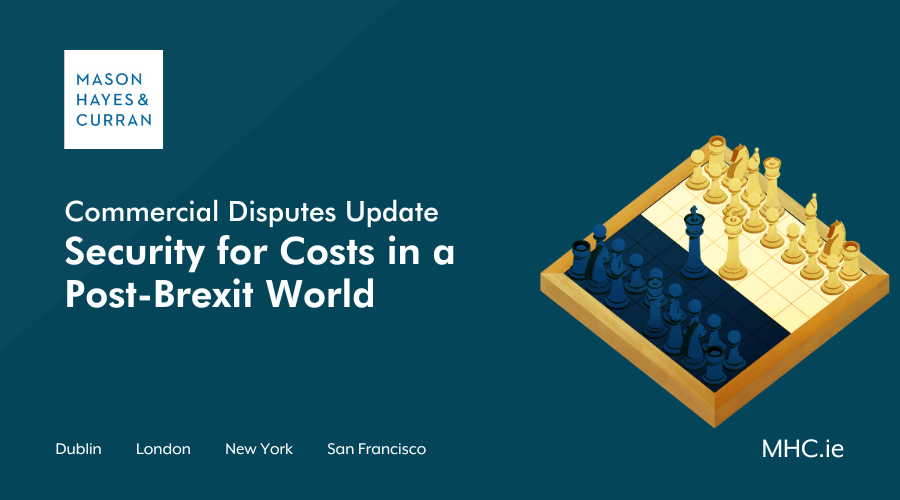
A recent High Court decision confirmed that security for costs may be successfully pursued against a UK-based individual. This decision serves as a useful reminder that it is only EU-based individual plaintiffs against whom these orders may not be sought. Therefore, in a post-Brexit world, defendants should bear in mind that an individual who is a UK-based plaintiff may be required to give security for costs as a condition of being allowed to progress the litigation. Our Commercial Disputes team examines the decision.
A recent High Court decision[1]
involved the court directing that a UK-based individual plaintiff was required to give security for costs. This serves as a useful reminder that, although these orders may not be sought against EU-based individual plaintiffs, in a post-Brexit world these applications may be brought successfully against UK-based plaintiffs. This means that defendants to cases brought by UK-based plaintiffs have the opportunity to seek security for costs which would be unavailable against an EU-based individual plaintiff. This represents an additional protection to defendants who fear that any costs order in their favour at the end of the proceedings may be worthless due to the financial position, or insolvency, of a UK-based plaintiff.
Background
Irish civil procedure permits a defendant to ask the court to make the plaintiff provide security for the defendant’s costs of the proceedings. This may be ordered if a defendant has a justifiable concern that it may be difficult to get the plaintiff to make good on any order for costs at the end of the case. If security for costs is ordered, the plaintiff is required to put up security, typically by way of cash or a bond, before the case can move forward. If the defendant wins, they can get their legal costs paid, although this entitlement must be balanced against the right of the plaintiff to access justice and the right to have their case heard. As a general principle, security for costs would not be ordered against an individual unless they were resident outside the jurisdiction. This is reflected in the language of Order 29, Rule 3 of the Rules of the Superior Courts. The rationale was that enforcement would be more complicated and expensive than if the individual plaintiff were located within Ireland.
However, the development of EU law and the greater harmonisation of enforcement procedures meant the distinction between domestic and EU plaintiffs came to be seen as discriminatory.[2] In particular, the EU’s judicial function has addressed the interpretation of Article 12 of the EC Treaty, as it was. This questioned the domestic laws of Members States which might appear to indirectly discriminate on grounds of nationality, like those regarding security for costs. Arising from Irish decisions in light of those rulings, such as Pitt v Bolger[3], the courts were unwilling to exercise their discretion to order security for costs where a straightforward enforcement regime existed relating to the relevant jurisdiction. This was the case under the Brussels Convention and, more latterly, the Brussels Regulations, both original and recast. These applied to the UK until Brexit.
Decision
The case here concerned an accident at Dublin Airport where the plaintiff, a UK national, brought proceedings in 2021 relating to the embarkation of a Ryanair aircraft at Dublin Airport. She issued a personal injuries summons against both the Dublin Airport Authority (DAA), as operator of the airport, and Ryanair, alleging negligence, nuisance and breach of duty of care. The DAA sought security for costs, detailing in its grounding affidavit that it had a legitimate defence to the claim, and alleging that it had concerns she would not be good for any costs awarded in it’s favour. The plaintiff did not assert she was otherwise without means, or was likely to become insolvent, and that the order should not be made for ‘special circumstances’ under the applicable test. Rather, in her replying affidavit, she set out the assets available to her to meet any such order. She also contended that it would be straightforward for any costs to be enforced in the UK courts, stating that the UK is “the neighbouring jurisdiction with the same legal system and language used”.
However, Ms Justice Bolger observed that the question was whether it would be more difficult or expensive than enforcing such a costs order in Ireland. She also noted that the UK was “very significantly, no longer part of the EU” and therefore not within the straightforward EU enforcement mechanisms. Ultimately, Ms Justice Bolger concluded that the DAA was entitled to an order for security for costs as it had established in accordance with the court rules that the plaintiff resided outside the jurisdiction, but not in the EU, and the DAA had a legitimate defence. Critical in coming to that view was that “enforcement of any such order will be more difficult and expensive… as it will have to be made in the UK, a non-EU jurisdiction.”
Conclusion
The decision highlights that, in an appropriate case, security for costs may be ordered where the plaintiff is a UK-based individual. The stated rationale in this case was that the enforcement of any costs order in the DAA’s favour would be more difficult and expensive than if the plaintiff were based in the EU. Although it is unclear how much more difficult or expensive this enforcement in the UK might be, it is clear that security for costs is available against these types of plaintiffs. This is something defendants may consider and seek to exploit where UK-based individuals are involved as plaintiffs. However, it remains to be seen how, and to what extent, more streamlined enforcement procedures involving the UK - like the Hague Judgments Convention, which the UK had recently signed[4] - might dilute the availability of this security.
For more information and expert advice on commercial disputes, contact a member of our Commercial Disputes team.
The content of this article is provided for information purposes only and does not constitute legal or other advice.
[1]Henderson v DAA & Ryanair DAC [2024] IEHC 29.
[2] Mund & Fester v Hatrex Int Transport [1994] ECR I-467; Boussac Saint Freres SA v Gerstenmeier [1980] ECR 3427
[3] [1996] 1 IR 108
[4] See our article: https://www.mhc.ie/latest/insights/uk-to-join-hague-judgments-convention





